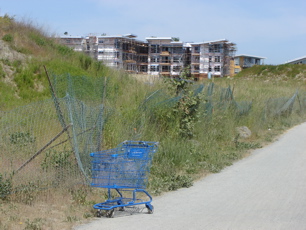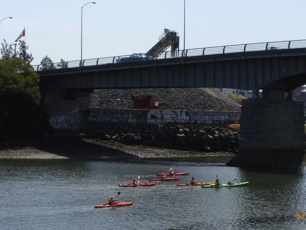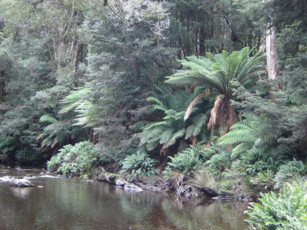(The History of the World, Part 2)
A review of Derrick Jensen live
Victoria, BC - 20 Oct 2007
Derrick Jensen speaks much as he writes: eloquently, haltingly, off-the-cuff; his insights and remarks are brilliant, provocative, profound, disturbing, irreverent, politically incorrect -- no matter what your politics are. While politics in the conventional sense is the game of power and its subsidiary ethics, here we have a more radical approach to living in the world than accepting the myopia of the urban lifestyle; now nature is reintroduced to the equation.
Nature (including plant and animal species, ecosystems of land, water and air, and traditional subsistence peoples) is no stranger to the inequation of power, suffering these 60 or 100 centuries of abuse, rape, plunder and blunder, burning, rending, killing, enslaving, forgetting. Now up for discussion, for once, is the Endgame, as Derrick calls his latest two-volume study of what is involved in the necessary dominance and even more necessary demise of civilization.
Civilization is characterized by cities, which require (DJ’s emphasis) for its people the importation of food and related resources . . . and therefore it requires the coerced or forcible removal of those necessities from the hinterland, the colonies, the rural poor, the wilderness, the stolen land. The end of the game comes with the end of denial.
The hardest step in the recovery program is the first step, which is to awake from denial. So important and so immense, in fact, is this first step, that the entire two volumes of Endgame (I: The Problem of Civilization; II: Resistance) are devoted to it, as was the entire address tonight. A single questioner after the talk inquired about the kind of society that might replace the one that has brought itself and everything else along with it to the brink of universal ruination; but Derrek begged off that question, as he had the earlier one, “What can we do?”
“Your actions will come with the gifts you have to bring,” was his answer (and here we find a refreshingly Emersonian version of democracy, to oppose to the current Orwellian distortions of that noble principle). In the meantime the more pressing matter -- “the axe held over the head” -- must be addressed, immediately, and it will take every ounce of our attention. The only way we can give it our proper attention is to recognize the extent of the emergency.
 That we actually have an emergency situation on our hands is a logical if not always visible fact of a lifestyle based on nonrenewable or overzealously harvested resources. But we can only continue to be lulled for so long by belief in the romantic dream and hope of civilization-forever-after, as most of the dying is still hidden (except when 80% of those in the audience raise their hands at the question “How many of you have lost a loved one to cancer?”), and everything keeps whistling away (though at a higher and higher pitch of anxiety and tension), toward the edge of the cliff, with noses lifted high in the air (as if to hide with pride the stench of extinction and genocide) .
That we actually have an emergency situation on our hands is a logical if not always visible fact of a lifestyle based on nonrenewable or overzealously harvested resources. But we can only continue to be lulled for so long by belief in the romantic dream and hope of civilization-forever-after, as most of the dying is still hidden (except when 80% of those in the audience raise their hands at the question “How many of you have lost a loved one to cancer?”), and everything keeps whistling away (though at a higher and higher pitch of anxiety and tension), toward the edge of the cliff, with noses lifted high in the air (as if to hide with pride the stench of extinction and genocide) .
Or we do know better, but we pleasantly forget (tonight, after all, was game 6 of the baseball playoffs . . . “Maybe the Indians will win this time,” quipped Derrick). Or we should know better, but we take action believing our citizen-ship enterprise can be salvaged, and so we continue to vote, and to buy, steal or pray for our clean water and nutritious food from elsewhere without ever giving anything back, not in humble sacrifice of sacred respect or stewardship, nor truly fair price and trade to those in a distant land. Come to think of it, what would a truly fair price be, in the whole ecological scheme of things? The answer could well be, as Derrick Jensen suggests, no price at all -- but rather our sacrifice of such power, in favor of the power of our willingness to listen to our local landbase and its native peoples for instructions on how to survive.
In this reflective summary I risk putting words in Derrick Jensen’s mouth: and yet his message was clear and central: we need each to find our own path through these woods, toward new springs.
 As I drove away from the campus auditorium down the highway skirting the city, the reality of civilization struck me with new clarity and naked truth. I was driving a machine of death on roadbeds of death through a misty night in a world of human creation: the music and heater on, the windows rolled mostly up, those in other cars invisible or oblivious behind separate barriers and windows . . . and then I wondered, in this state of naked awareness, what next? What do I do about it? How do I respond to what’s around me and what it represents on a planetary scale?
As I drove away from the campus auditorium down the highway skirting the city, the reality of civilization struck me with new clarity and naked truth. I was driving a machine of death on roadbeds of death through a misty night in a world of human creation: the music and heater on, the windows rolled mostly up, those in other cars invisible or oblivious behind separate barriers and windows . . . and then I wondered, in this state of naked awareness, what next? What do I do about it? How do I respond to what’s around me and what it represents on a planetary scale?
The short answer is, keep driving. Relax, breathe, you can do this, you know the rules of the road, it is possible to operate this machine safely. Once home I turn on the lightswitch, the computer, use the toilet, eat some yogurt and blueberries, make a cup of mocha for this session of writing. When I was in the car I was inspired with a wave of good music: especially the wailing Middle Eastern fusion that somehow proved a theme song for this world of the automobile, the Oil Age.
So my answer, like Derrick’s personal reponse, is “I’m a writer.” I am also a musician, a teacher, an editor, a reviewer . . . With these callings I feel integrity, even though in their present context they are products of civilization. I can use them despite their compromises also to reach beneath and above and beyond the layers of civilization attached to them, to their core as cultural expressions and as means of reconnection to nature, to human nature, to spirit.
As Derrick so succintly put it, he can still use toilet paper while he works to dismantle Weyerhauser. Or, he can feel despair over the suffering civilization inflicts, while also retaining the capacity for determined resistance and healthy happiness to be alive.
His brand of humor is black, nearly rude and almost crude throughout the live performance, yet he has a deft touch not to overdo it, and the result was a palpable rapport with a sympathetic and attentive audience. The same quality of irony comes across in a drier form in the written text.
Undoubtedly the most poignant moment of the evening came an hour into the question period after the talk. One man complaining of nearsightedness came onto the stage and kneeled in front of Derrick to get a close look at his face, and then said how sad it made him feel that Derrick had said “Fuck ‘em” in regard to the supposed threat of a “security” clampdown on his freedom of speech.
Derrick’s voice softened as he spoke, without irony and with great patience, explaining how his epithet was really just a kind of shorthand for not being willing to be coerced into inaction and silence.
Perhaps the most profound moment for me was Derrick’s story repeated from his book, about a conversation with someone presenting the argument of dualism: “Derrick, you’re so dualistic -- so, us and them, bad and good, civilized and natural . . . ” His response: “Okay, what about dualism and nondualism; dualism -- bad; nondualism -- good . . . ?” The same question might be posed about “Resistance,” the subtitle of Endgame, Volume II. The spiritualist might respectfully advise against (if not outright protesting) such a compromise from unitary, all-embracing higher consciousness. Yet again there is an inherent and ironic complicity in such a judgment: resisting resistance. The pacifist heroes Gandhi and King were nothing if not fierce and unwavering resistors. Derrick’s expansive acceptance comes into play more in respect to forms of resistance than to condoning a culture of slaughter and degradation. His battle cry facing a consumeristic culture whose motto is “Everything must go” would be “Anything goes.” He draws the moral line at actions like bombing a children’s hospital -- actions committed instead under the banner of freedom and democracy.
When do we begin to resist? When do we use the word apocalypse? When do we wake from the hypnosis that everything is fair and fine, or flawed or fucked, but as it must be? Maybe the last words in this review should be the refrain that Derrick repeated several times in a row, midway through his talk. The rate of survival in the Warsaw Ghetto Uprising was better than that of the Jews who went peacefully to the death camps.
Derrick likened his predicament (and ours, now that he has helped us see it), to “living in Germany in 1938.” Until our awakening to action in our own way, we are the “good Germans” and we are the Jews, riding together at last on the same train to deva-station. Yet the action we decide and are gifted to take does not come in a written manual or a speech to the masses, nor in any one set of strategies or tactics. It comes through individual and collective inspiration: through the message of the river that spoke so poetically and precisely to and through Derrick in the closing prose of his speech, and through the implicit community and shared witness of the people assembled to hear him.
The actions of resistance are everything that conscious people are already doing. Resistance continues from each moment to the next, in undefined actions to come, as we awake further and connect more to our fellow humans and fellow species and the resilient land we walk on (if we still walk at all). Our actions of resistance and survival and renewal will persist and multiply, given the awakened will for facing “the Stone Age” to come, and for navigating the rocky ice-bridge to it with eyes and ears open and hearts full.
 |  |
Postscript:
A decade ago I wrote a review of some similarly end-of-history overviews, with one notable programme (The Millennium Project) recognizing on the one hand the same impossibility of continuing on the present path of overconsumption, while refusing to “go backward” to an uncivilized state of nature. The solution instead was foreseen in deep space, where humans could continue their divine mission to “go forth and multiply” indeed forever, through the infinity of space with its endless “resources” for the taking. This fantasy is moot by now as the window has already passed for such a project to be launched from an overabused earth (as the author warned at the time of its writing a decade ago). Without that vain hope to sustain us; and likewise without the Maoist vision of a populist agrarian utopia; and likewise without the neo-liberal dream of universal democracy (now blown to tatters by its neo-conservative evil twin embarked on an openly fascist imperial agenda); and likewise without the green delusions of happy hippy ecotopias recycling bicycle tires to the end of time; we are left with the one course that is both natural and humane. That final remedy is the bitterest pill to swallow; but unlike the “final solution” of the holocaust, it is the path of finding a hard yet possible future by making the hardest choices now.
 It is a hard and bitter path because we have been so utterly convinced that it is the wrong one, the one to leave behind, the one to eradicate and transform and evolve from; and we have grown so utterly dependent on our short-lived alternative, so beguiling with its comfort and ease and excess, so intoxicating with its riches transferred to us from the other side: the invisible earth, the silent victims, the dispossessed. Of course we don’t want to slide back to the Stone Age. We will go kicking and screaming backwards, or kicking and screaming forwards -- sacrificing our comfort, or others’ lives and livelihoods, in the process -- but go we will, to the unpromised land, the land finally free of unsustainable promises. Today or tomorrow, one way or another, by our action or inaction, we will go out of our false and manufactured Eden, into the wilderness; we will find our way home.
It is a hard and bitter path because we have been so utterly convinced that it is the wrong one, the one to leave behind, the one to eradicate and transform and evolve from; and we have grown so utterly dependent on our short-lived alternative, so beguiling with its comfort and ease and excess, so intoxicating with its riches transferred to us from the other side: the invisible earth, the silent victims, the dispossessed. Of course we don’t want to slide back to the Stone Age. We will go kicking and screaming backwards, or kicking and screaming forwards -- sacrificing our comfort, or others’ lives and livelihoods, in the process -- but go we will, to the unpromised land, the land finally free of unsustainable promises. Today or tomorrow, one way or another, by our action or inaction, we will go out of our false and manufactured Eden, into the wilderness; we will find our way home.
 |  |








